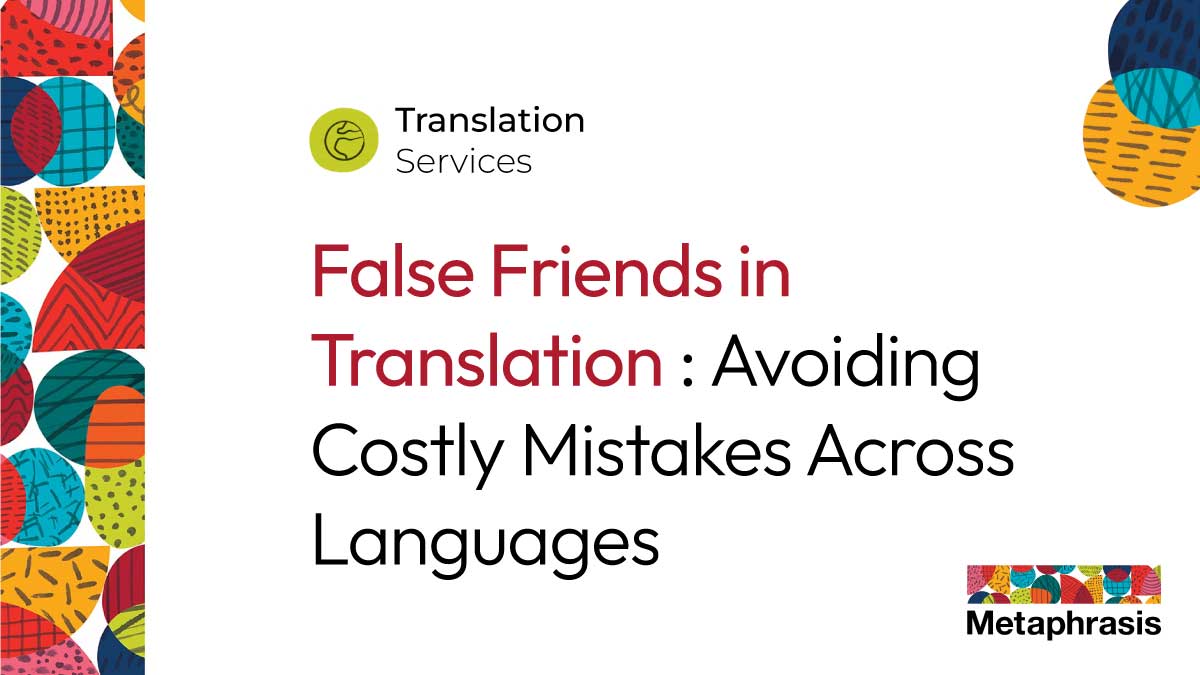
False Friends in Translation: Avoiding Costly Mistakes Across Languages
Ever used a word in a foreign language that looked familiar? But it didn’t mean what you thought? Translators call these false friends. These words can look or sound nearly identical in one language but have very different meanings in another. The result? Confusing responses in your personal communication, and sometimes even unintended consequences in professional settings.
At Metaphrasis, we often see false friends in our multilingual projects. This is especially important for certified translations for official documents as much as it is in creative adaptations for marketing. Let’s decipher what false friends are and why they happen. And let’s show you how our expert linguists ensure your message always comes through clearly.
What Are False Friends in Translation?
Linguistically, false friends are words that appear similar in two languages but differ in meaning. Since they resemble each other, speakers mistakenly interchange the words. Sometimes, these mistakes are lighthearted. In professional settings, however, they can create confusion and misinterpretation. Without expertise and extensive experience in multilingual translations, it’s easy to get tricked by these false friends.
Why Do False Friends Happen?
You might wonder why false friends exist in the first place. Many started as cognates as language evolved over time. These are words that share the same origin but develop different meanings in each language. Some false friends arise from shared etymology, especially among Germanic languages, where words with common origins have changed to different meanings.
False friends also appear because of overconfidence. Beginners may hesitate, but fluent speakers or long-term immigrants sometimes lean on words that “look right,” even when they’re not. One of our linguists recalled a French translator who repeatedly confused the same false friends after years of practice. This shows how ingrained these habits can become without professional review.
What Are the Consequences of False Friends?
False friends can challenge even the most advanced speakers, including those who’ve lived in bilingual environments for years. They’re one of the most common reasons businesses and customers rely on trained translators to handle sensitive or high-stakes content.
For example:
- In Spanish, embarazada looks like “embarrassed,” but it actually means “pregnant.”
- In French, location doesn’t mean a physical place; it means “rental.”
- In German, Gift means “poison,” not a present.
These examples highlight how a single mistranslation can shift meaning in unexpected ways.
False Friends Across Different Language Pairs
Common False Friends in Spanish
- Embarazada: looks like “embarrassed” but means pregnant.
- Atender: looks like “attend” but means to assist or serve.
- Librería: looks like “library” but means bookstore.
- Actual: looks like “actual” but means current.
- Realizar: often mistaken for “realize” but means to carry out or perform.
Mistakes like these can alter the meaning of business contracts, training manuals, or HR policies. That’s why our Spanish Translation Services go beyond word-for-word substitution. Our professional translators deliver accurate, culturally appropriate content that preserves the intended meaning of the original text.
Common False Friends in French
- Location: means rental, not a place.
- Actuel: means current/present, not “actual.”
- Stage: means internship, not a performance stage.
- Sensible: means sensitive, not “reasonable.”
- Avertissement: means warning, not “advertisement.”
Certain expressions in French can also act as false friends. Mixing these up could cause a document or message to sound unclear. With our professional French Translation Services, your content is always translated with precision and cultural insight.
Portuguese and English False Friends
- Fabricar/Fábrica: means factory, not fabric.
- Agenda: means notebook, not a meeting plan.
- Pasta: means folder or briefcase, not pasta (the food).
- Colégio: means school, not college.
- Atualmente: means currently, not actually.
Even simple words like “push” and “pull” can cause mix-ups. One Brazilian Portuguese speaker joked that no matter how long they’ve lived in the U.S., they still confuse “push” with puxe (which means pull). These instinctive mistakes underline the value of Portuguese Translation Services, where trained professionals ensure your documents communicate clearly.
Can False Friends Change the Meaning of a Document?
Yes. A single mistranslated word can shift meaning in ways that matter:
- Legal translation: A false friend in a contract can affect obligations or clarity.
- Medical translation: Confusing a term could impact patient instructions or treatment details.
- Marketing translation: A brand message could lose its intended impact.
That’s why expert review is essential in every project. While AI tools can provide support, professional human expertise ensures that nuance and accuracy are preserved.

How Does the Metaphrasis Team Avoid False Friends?
Our professional translators know how to navigate these challenges. They use:
- Contextual understanding: Identifying meaning based on subject, audience, and culture.
- Subject-matter knowledge: Legal, medical, and technical translators specialize in industry terms.
- Quality checks: Multi-step review processes ensure accuracy beyond what machine translation can achieve.
- Native speakers: Using translators who are native speakers ensures cultural and linguistic accuracy.
- Proofreading: Careful proofreading as part of the quality assurance process helps catch errors and maintain professionalism.
At Metaphrasis, our team includes both translators and project managers. We work hand in hand to deliver precise and consistent results.
The Value of Professional Translation Services
False friends may seem like small errors, but their impact can be significant. They’re a reminder that clear, accurate communication requires more than just language knowledge—it requires cultural understanding and professional expertise.
At Metaphrasis, our translators combine linguistic expertise with industry knowledge to deliver comprehensive language solutions. Whether for official documents, creative content, or business communication, we ensure your message is delivered exactly as you intend.
You can contact our professionals at Metaphrasis at (815) 464-1423 to learn more about our Professional translation services.
